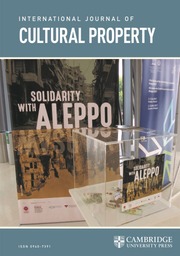Article contents
Cultural property ethics
Published online by Cambridge University Press: 18 February 2005
Extract
After briefly discussing ethics in general, stating the public interest in cultural property, and positing that collecting and dealing in cultural objects are not inherently unethical activities, the writer contrasts ethical attitudes toward legal controls over the international movement of people and of cultural objects. He then discusses the ethical bases of cultural property export controls and ethical questions raised by dealing in and collecting cultural objects, and identifies particular applications of export controls that are ethically unproblematic or ethically clouded. He discusses the difficult area of antiquities and questions whether anyone involved in it - from source nations, archaeologists, and ethnographers to museums, collectors, and the art trade - has clean hands. Finally, he states a hypothetical case of invited theft and asks readers to decide what the ethical response would be.
- Type
- Research Article
- Information
- Copyright
- © The International Cultural Property Society
- 6
- Cited by


